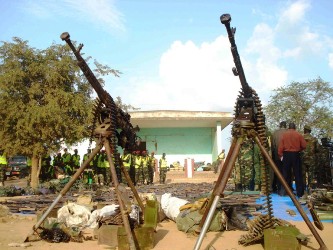South Sudan breaching arms embargo, says UN Experts Panel
May 14, 2024 (JUBA) – A new report by a United Nations Panel of Experts on South Sudan has accused the Juba government of a potential breach of an arms embargo imposed on it in 2018 after it appeared to have made additional efforts to procure weapons.
The Panel, in a report submitted to the Security Council on Tuesday, said it identified several weapons not previously observed in South Sudan, raising queries on their origin
The Security Council imposed an arms embargo on South Sudan through Resolution 2428 (2018) and has since renewed it several times with the most recent renewal being through Resolution 2633 (2022). The Council, however, said it would review the arms embargo measures if South Sudan fulfilled certain benchmarks, mainly related to security reforms.
According to the report from the UN experts, a MP5A5 submachine gun with a retractable buttstock and a three-round burst trigger group was observed in the possession of a security detail for the Governor of Upper Nile State on 11 December 2023.
Also identified, it said, was a Micro Tavor X95 submachine gun in the possession of a bodyguard for government dignitaries in Terekeka County, near Juba, on 6 January 2024.
The 184-page report further observed that the Panel reviewed additional documents indicating ongoing efforts by the Ministry of Defence and Veterans Affairs to procure lethal military equipment during 2023.
It said in one letter, dated 19 September 2023, the Director of Acquisitions requests quotes from suppliers for weapons including various rifles, machine guns, mortars and rocket launchers, as well as associated ammunition.
The letter, the reports said, includes a direction to potential suppliers that, owing to the arms embargo, “which limit the government’s direct import of classified equipment of military nature,” all contracts will be arranged with the Ministry of Defence and Veterans Affairs of Uganda, which will also be responsible for supplying all end-user certificates.
“There is no evidence that Ugandan authorities were aware of these directives, nor that they facilitated the import of military equipment as described in the letter”, it partly read.
Also cited in the Panel’s report were the recent explosions at South Sudan army (SSPDF) ammunition depots and weapons stores, amidst recommendations that the South Sudan should seek support for weapons and stockpile management.
“On 12 February 2024, the Government requested support for the training of the Necessary Unified Forces, including on inventory and stockpile management procedures, from the Regional Centre on Small Arms, based in Nairobi”, it noted.
Meanwhile the Panel corroborated several reports concerning the ongoing recruitment of youth, including children, by both the armed opposition forces (SPLA-IO) and SSPDF over the past year.
It stated that while SSPDF forces have attempted to fill gaps left by soldiers who deserted due to economic hardship, SPLA-IO forces appear to be attempting to grow their numbers in anticipation of a second phase of the unification process.
The Panel also cited reports of SSPDF youth recruitment around Maridi, in Western Equatoria State, as well as SPLA-IO recruitment in the same state, including after the defection of forces from their barracks at James Diko in Yambio County.
However, it says, while some recruitment appears to have been forcible, some youth also volunteered to join forces having viewed it as a viable economic alternative.
The Panel urged the Security Council to convene a joint informal consultation of its committee to discuss the conflict in the Sudan, and consider inviting a representative of the Government of South Sudan to provide an update on the impact of the conflict on its oil revenues and humanitarian situation.
(ST)

